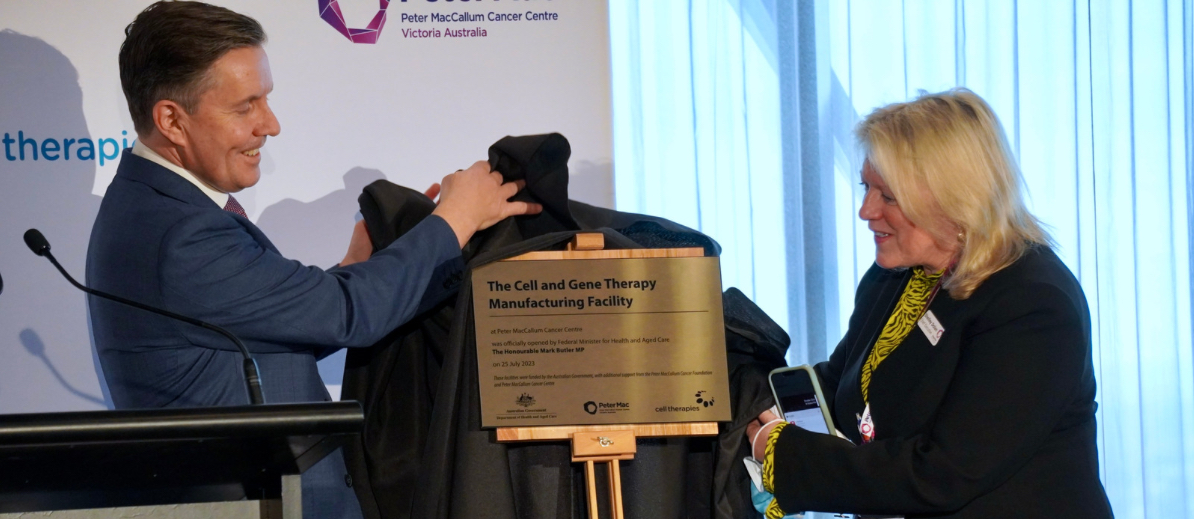
- Details
- Written by: Christopher Talbot
- Category: News
- Hits: 1788
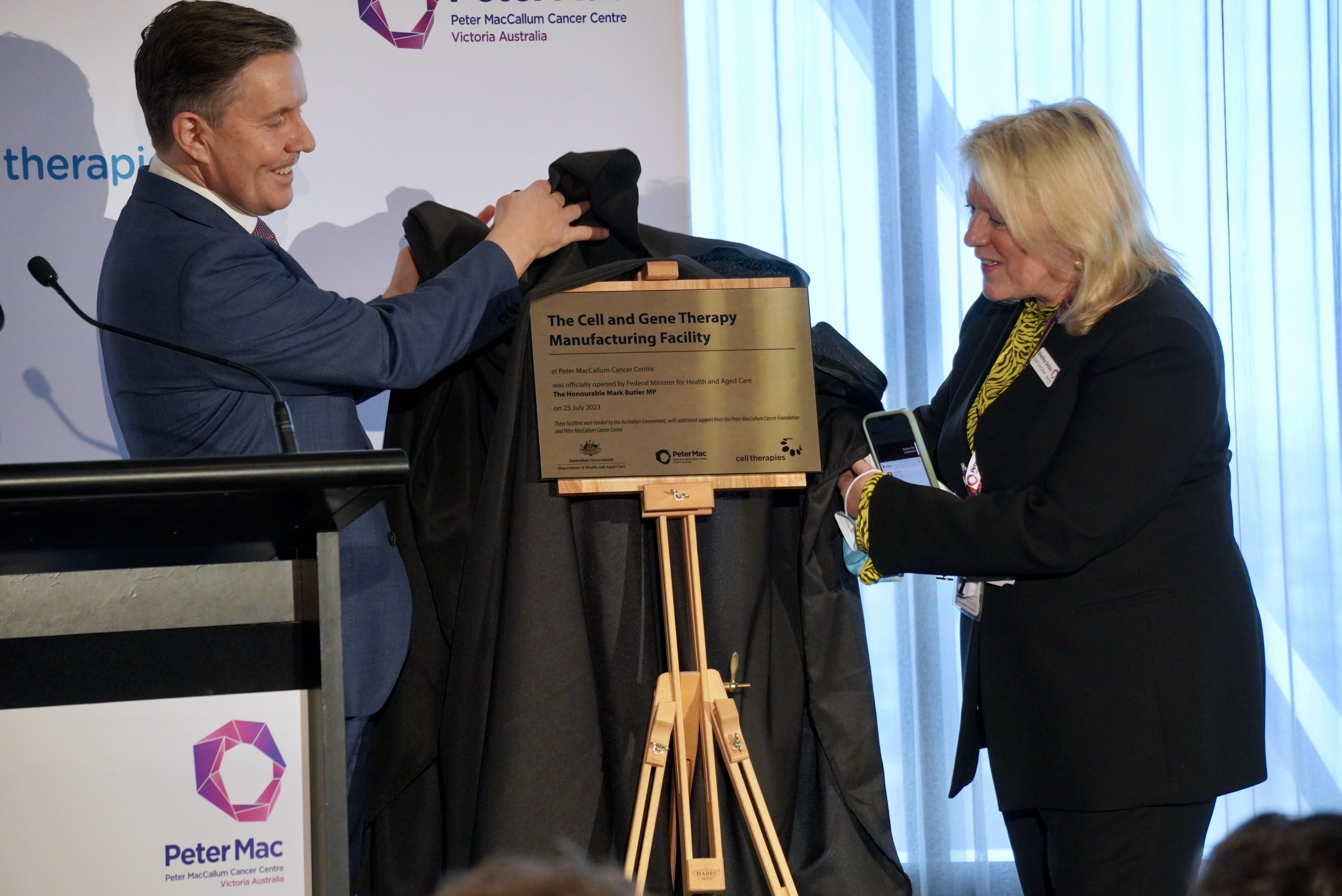
Australia’s only biomedical manufacturing site where CAR T-cells and other “living” cancer therapies can be made at commercial scale has expanded to meet future patient demand.
Federal Minister for Health and Aged Care, the Honourable Mark Butler MP, today toured and officially opened the expanded facility at Peter MacCallum Cancer Centre in Melbourne.
The works were completed as part of a $105 million project, announced in 2019, and which also includes construction of dedicated facilities for patients receiving these therapies at Peter Mac.
The funding included $80 million from the Federal Government, and the additional $25 million was contributed by Peter Mac and generous donors to the Peter MacCallum Cancer Foundation to advance cellular therapy research and patient care activities.
Minister Butler said each year more than 160,000 Australians were diagnosed with cancer and, among these, more than 19,000 would be diagnosed with blood cancer.
“It is inspiring to see how much these individualised cancer treatments, being developed and manufactured here in Melbourne, can change people’s lives,” Mr Butler says.
Operated by Cell Therapies Pty Ltd, and partner manufacturer for the Centre of Excellence in Cellular Immunotherapy at Peter Mac, the expanded GMP-grade facility:
- can make up to 2,000 CAR T-cell (or other cell or gene therapy) patient doses a year, up 400% from previous capacity
- has added more than 75 biomedical jobs, and is the nation’s largest trainer for cell therapy laboratory roles
- has 1,700 square metres of new, additional lab and clean room space.
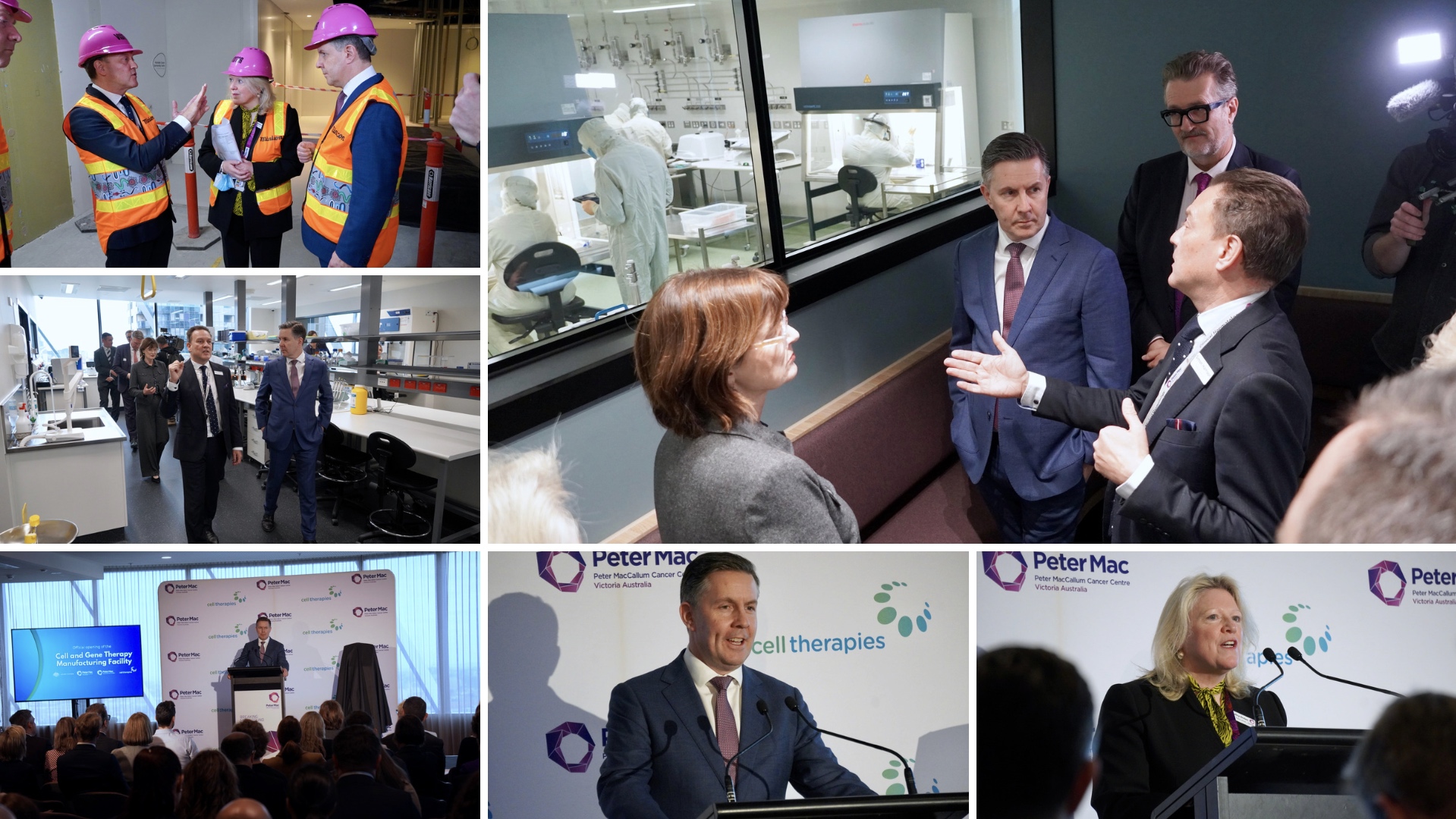
Peter Mac Chief Executive Professor Shelley Dolan said completing the manufacturing expansion was a major step forward for cancer patients in Australia and the Asia Pacific. The dedicated patient facility will open later this year.
With the Federal Government’s support, we are delivering on our vision for a world-class cellular immunotherapy centre in Australia and based at Peter Mac,” Prof Dolan said.
“The expanded manufacturing site has the necessary scale to provide CAR T-cell and other emerging cellular therapies to a growing number of patients in Australia and our region, and to support the rapid advances in related clinical and discovery-based research.”
Director of the Centre of Excellence in Cellular Immunotherapy Professor Simon Harrison said: “CAR T-cell therapy represents the pinnacle of personalised medicine as it involves collecting a patient’s own immune cells, re-engineering these cells so they recognise cancer, and infusing these re-engineered cells back into the patient.”
“Cellular therapies are living treatments that persist and expand in the body, and this approach has revolutionised how we treat many aggressive blood cancers and there is great hope they will do the same for solid tumours in the future.”
Acting Chief Executive of Cell Therapies Pty Ltd, Associate Professor Dominic Wall said the pandemic and global unrest had demonstrated the vulnerability of global supply chains and the value of onshore manufacturing capability.
“These expanded facilities at Peter Mac are now on par with only a handful of sites globally and combined with a highly specialised workforce, mean we have the ability to make more of these cutting-edge treatments locally, rather than importing them, and to even export these products.”
Construction of the expanded manufacturing facilities and dedicated clinical unit has been ongoing within the Victorian Comprehensive Cancer Centre building, with support from Plenary Health, Honeywell Pty Ltd and building contractor Minicon Construction.
Contacts
For more info or to arrange an interview contact the Peter Mac Communications team on 0417 123 048.
About CAR T-cell therapy
A cornerstone of modern immunotherapy is CAR T-cell therapy. This is “living drug” that represents the ultimate in personalised medicine. A patient’s T cells are re-engineered with Chimeric Antigen Receptors (CARs), expanded in a lab and reinfused into the body to attack and kill the patient’s cancer cells. CAR T-cells are designed to persist within the patient’s body for as long as a tumour is present – it is therefore intended as a one-off treatment which can prevent relapse. CAR T-cell therapy offers hope to patients for whom all other therapies have failed – it is demonstrating curative potential in previously incurable cancers such as myeloma.
Find out more information on subsidized access to CAR T-cell therapy
About Cell Therapies Pty Ltd
Cell Therapies Pty Ltd (CTPL) is one of the most experienced commercial contract manufacturers of global cellular therapy products. Since 2003, CTPL has provided essential infrastructure and expertise for development and delivery of these products into international clinical trials and commercial markets. Its state-of-the-art GMP facility in Melbourne, Australia, holds licenses from the Australian and Japanese regulatory authorities, de-risking product supply for the Asia Pacific region and serving as a single access point for regional deployment of cellular therapies. CTPL is a fee-for-service organisation and provides a complete process development and GMP product supply service from translational studies through to commercial supply. Key relationships with the Peter MacCallum Cancer Centre enable access to emerging research and clinical expertise.
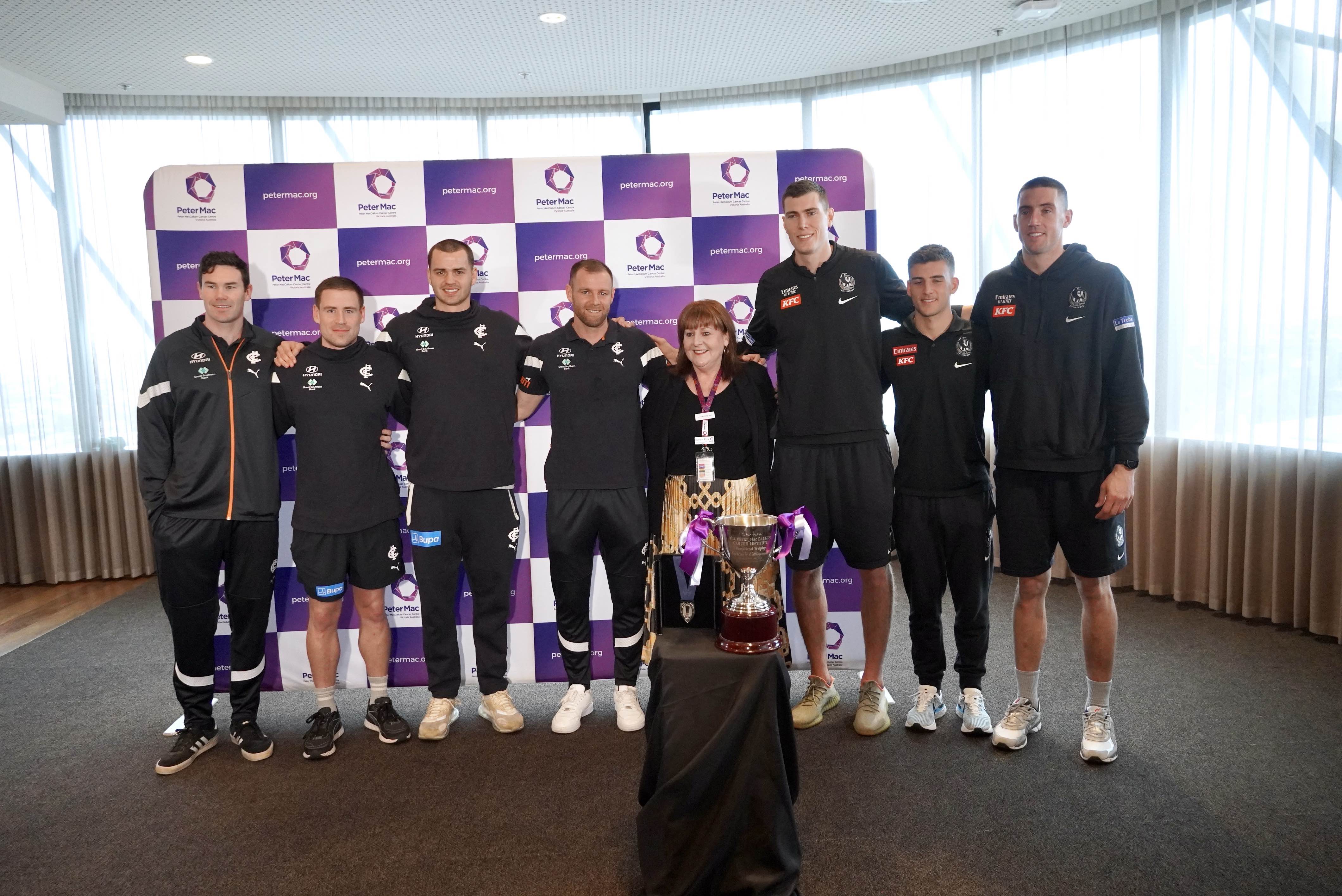
- Details
- Written by: Christopher Talbot
- Category: News
- Hits: 971

You may have seen the buzz around the building today as Carlton and Collingwood football players visited ahead of the Peter Mac Cup.
It's been 30 years since the very first Peter Mac Cup clash between the two clubs, the first bounce all the way back in 1993.
It's now the longest running charity match in AFL history - supporting the incredible fundraising efforts of the Peter MacCallum Cancer Foundation.
The generosity and support from both teams blows us away every year - and this year was no exception, with seven players from both clubs touring around the centre.
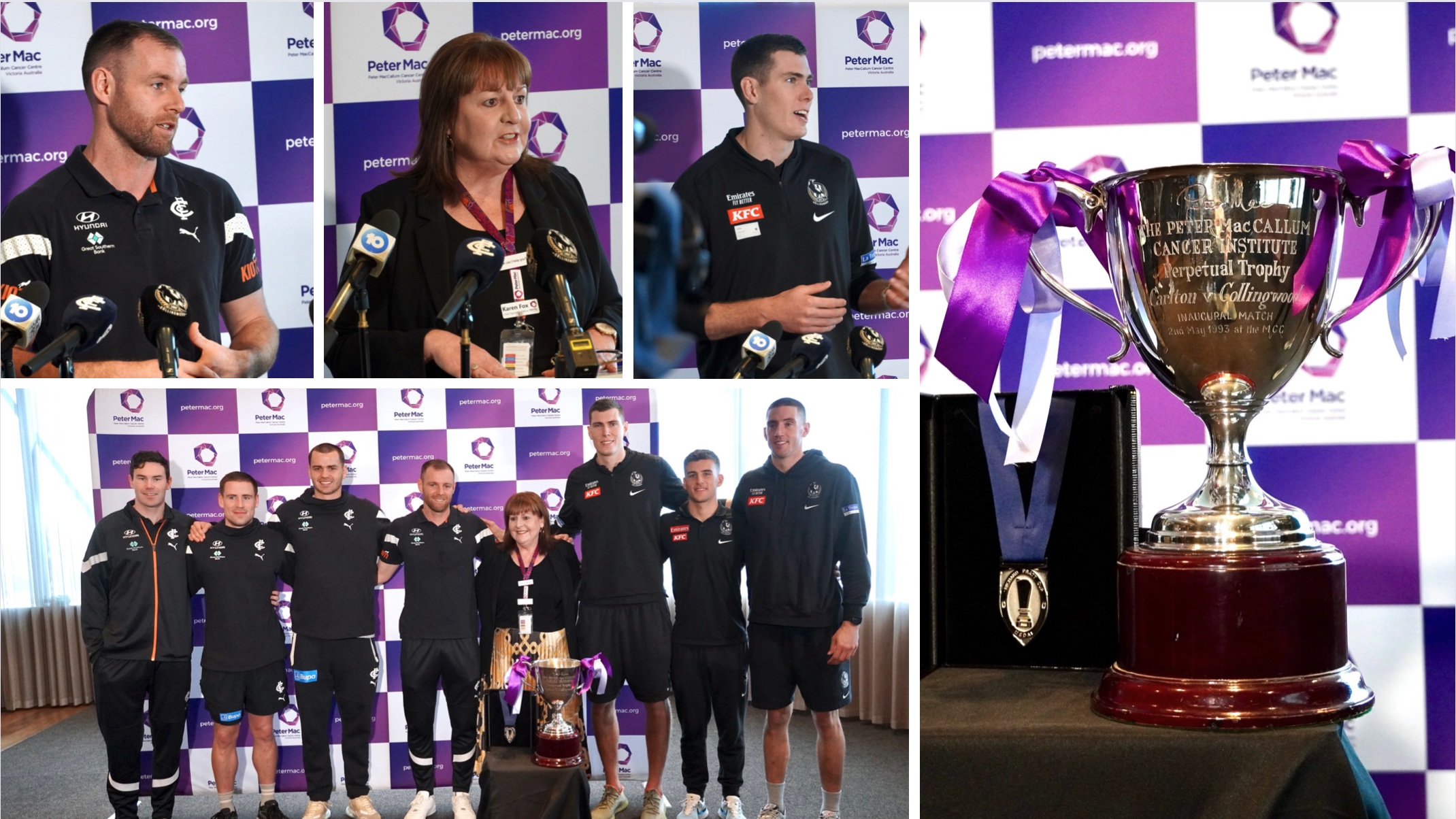
They met fans in Ward 6A, Ward 3A, Clinical Trials, Radiation Therapy and the Chemotherapy Day Unit, plus and a quick stop in the labs to hear about research from Ryan Brown in the Hogan Lab.
Huge thanks to Nick Daicos, Darcy Cameron and Mason Cox from Collingwood, and Sam Docherty, Mitch McGovern, Brodie Kemp and Matt Owies from Carlton.
We want his year's Peter Mac Cup to help us level the playing field when it comes to treating cancer.
Every dollar raised will help Peter Mac researchers make new world-leading breakthroughs that will help improve treatments, care and outcomes for people with cancer.
Show your support by visiting the Peter Mac Cup fundraising page.
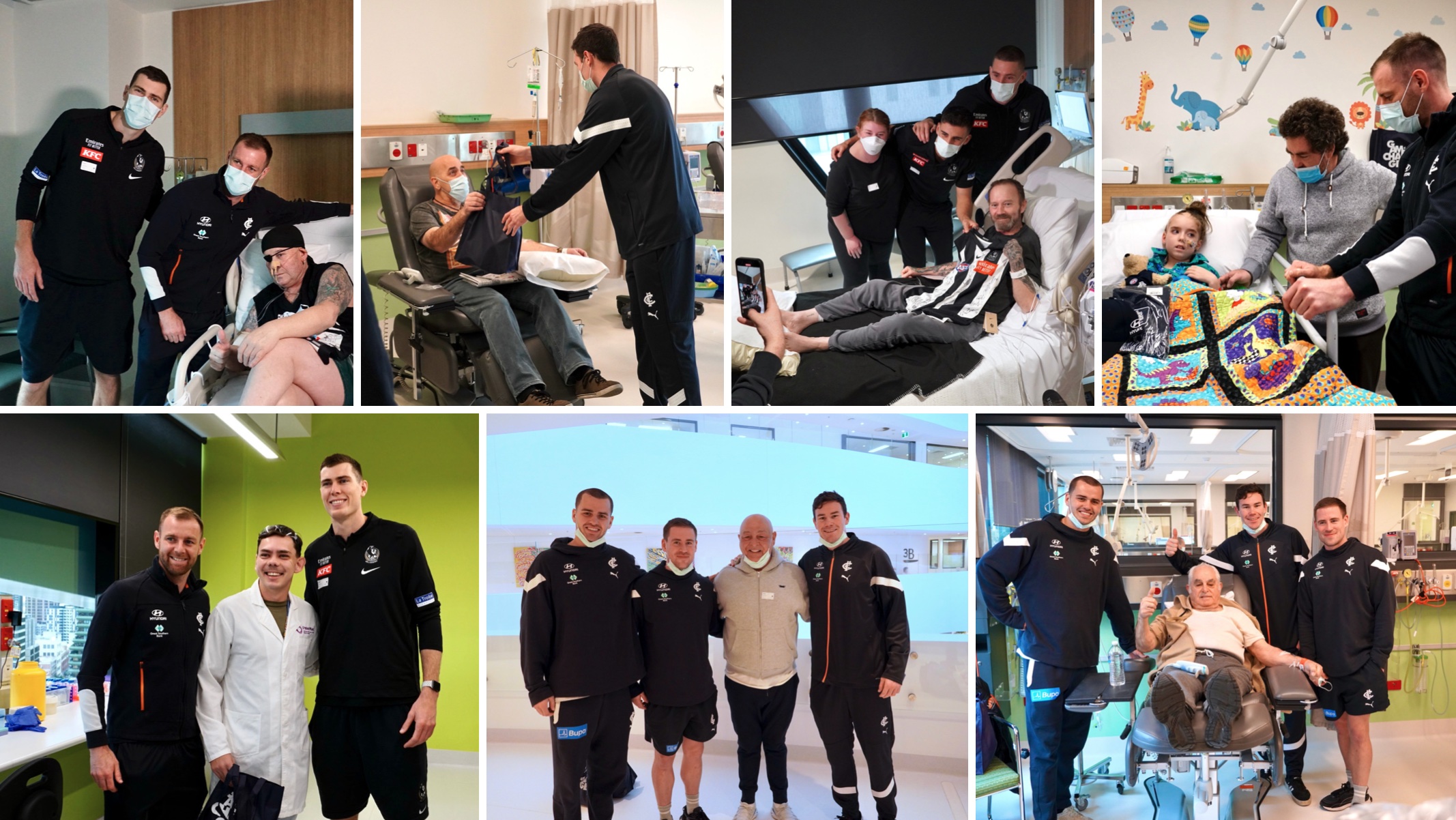
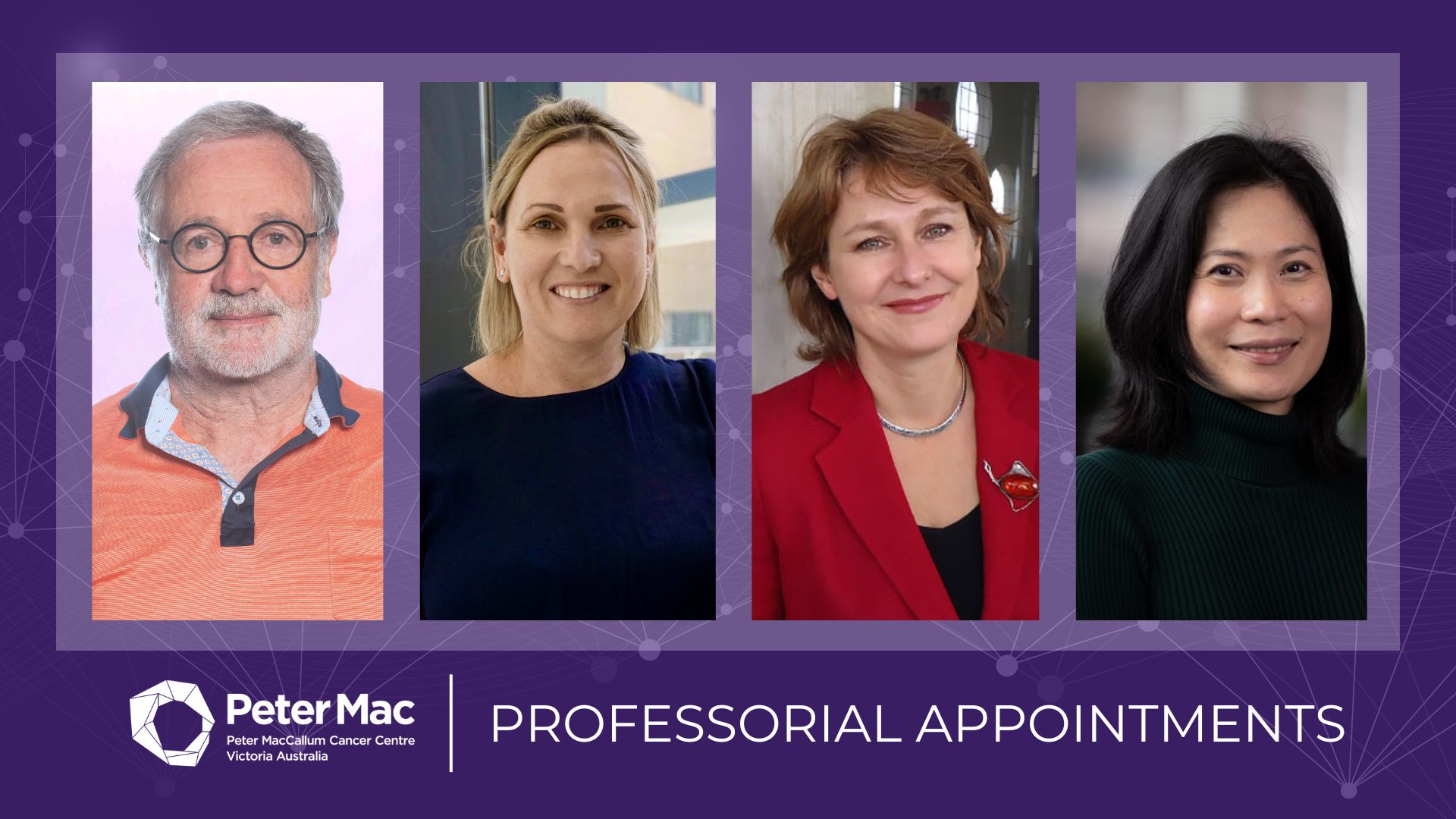
- Details
- Written by: Mandi Robertson
- Category: News
- Hits: 399

Congratulations to Jeanne Tie, Penny Schofield, Tomas Kron and Belinda Parker who have recently earned the appointment of Honorary Professorial Fellow (Level E) with the Sir Peter MacCallum Department of Oncology, at the University of Melbourne.
Professor Tie is a consultant medical oncologist at Peter MacCallum Cancer Centre and Senior Clinical Research Fellow at the Walter and Eliza Hall Institute of Medical Research.
As a colorectal cancer clinician researcher, Professor Tie is focussed on the clinical applications of circulating tumour DNA (ctDNA). She has received grant funding totaling over eight million dollars and has been instrumental in setting up a ctDNA clinical program and is spear-heading several world-leading ctDNA-guided randomised adjuvant clinical trials in colorectal cancer.
Professor Schofield has been the Professor of Health Psychology, Department of Psychology, Faculty of Health Sciences, Swinburne University of Technology since 2015. In 2022 she was re-appointed at Peter MacCallum Cancer Centre as the Professor of Digital Cancer Care Innovation. This role enables her to expand her own programme of oncological behavioural science research, particularly in digital technology; and to identify and foster broad transdisciplinary research collaborations between Peter MacCallum Cancer Centre and Swinburne University of Technology.
Professor Kron OAM commenced his career at Peter Mac in 2005 as a principal research physicist and is currently the Director of Physical Sciences. He has been a significant contributor to the Trans Tasman Radiation Oncology (TROG), one of Australia’s leading collaborative cancer trials group.
He migrated to Australia from Germany after completing his PhD to commence a career in radiotherapy physics. He moved to Canada from 2001 til 2005 where he worked at the London Regional Cancer Centre and led the commissioning of one of the first TomoTherapy units.
Professor Parker is co-Head of the Cancer Evolution and Metastasis program and Head of the Cancer Metastasis and Precision Immunotherapy laboratory at the Peter MacCallum Cancer Centre. She is currently an NHMRC Investigator Fellow after holding a VCA Mid-career and ARC Future Fellowship.
She has extensive expertise in cancer metastasis and the tumour microenvironment, combination immunotherapy trials, preclinical metastasis models, bone metastatic dormancy, and biomarker discovery. Her patented biomarkers are currently being tested in partnership with a range of pharmaceutical companies for precision radiotherapy and immunotherapy approaches.

- Details
- Written by: Danny Rose
- Category: News
- Hits: 350
Each year around 2,400 Australians are diagnosed with sarcoma. For one of Australia’s rarer cancers, it can have a big and lasting impact particularly on the young.
“Sarcoma is a cancer that disproportionately affects young people,” explains Peter Mac’s Dr Jeremy Lewin.
“Occurring at a critical life stage, it can change the trajectory of a young person’s life”.
Dr Lewin is a medical oncologist with expertise in sarcoma, and Research & Education Lead for Sarcoma for the Victorian Comprehensive Cancer Centre Alliance.
He is also Medical Director of the Victorian Adolescent and Young Adult Cancer Service at Peter Mac which provides dedicated supports for young people with cancer, including many with sarcoma.
Sarcoma occurs when healthy cells in the bone change and grow out of control, forming a tumour. If not found in time, this can destroy the affected bone and tumour cells can get into the bloodstream and form more cancers elsewhere in the body.
While sarcoma, or bone cancer, can occur at any age it is commonly seen in children, teens and young adults.
“My call particularly to young Australians is to be on the look-out for any unusual swelling, lumps or bumps on your body as this can be a sign of sarcoma,” Dr Lewin says.
“Your GP can check these and, if needed, refer you to a specialist centre like Peter Mac noting that early detection makes these cancers easier to treat.”
Treatment can include chemotherapy, radiotherapy and surgery and, when the sarcoma is found before it has spread, most patients can be cured.
July is Sarcoma Awareness Month, and Dr Lewin will join with other sarcoma experts to discuss this cancer during two online webinars.
Register via the links below for these events which are supported by the Australia and New Zealand Sarcoma Association (ANZSA)
ANZSA is the peak body for the sarcoma community and aims to improve outcomes for sarcoma patients through research, education and awareness of sarcomas and related tumours. It also fosters effective collaborations across multi-disciplinary teams working together to discuss sarcoma and related tumours cases, and how to best manage treatment and care.
Webinar 1: Early Diagnosis in Primary Care: A Comprehensive Approach to Improving Outcomes
When
Monday, 17th of July, 1pm – 2pm AEST
Speakers
- Host: Dr. Jeremy Lewin (Medical Oncologist)
- Associate Professor Claudia Di Bella (Orthopaedic surgeon)
- Ms Stephanie Webster (Consumer Representative)
- Meena Rafiq (Academic GP and Clinical Research Fellow)
Webinar 2: Advancing Sarcoma Research Through Clinical Trials: A Webinar on Current and Future Direction of ANZSA (Australia and New Zealand Sarcoma Association)
When
Thursday 27th of July, 1pm – 2pm AEST
Speakers
- Professor Jayesh Desai (Medical Oncologist)
- Jeremy Lewin (Medical Oncologist)
- Ms Julijana Todorovic (Consumer Representative)
- Ms Karen Lurati (Consumer Representative)
- Ms Sarah Cheung (Consumer Representative)
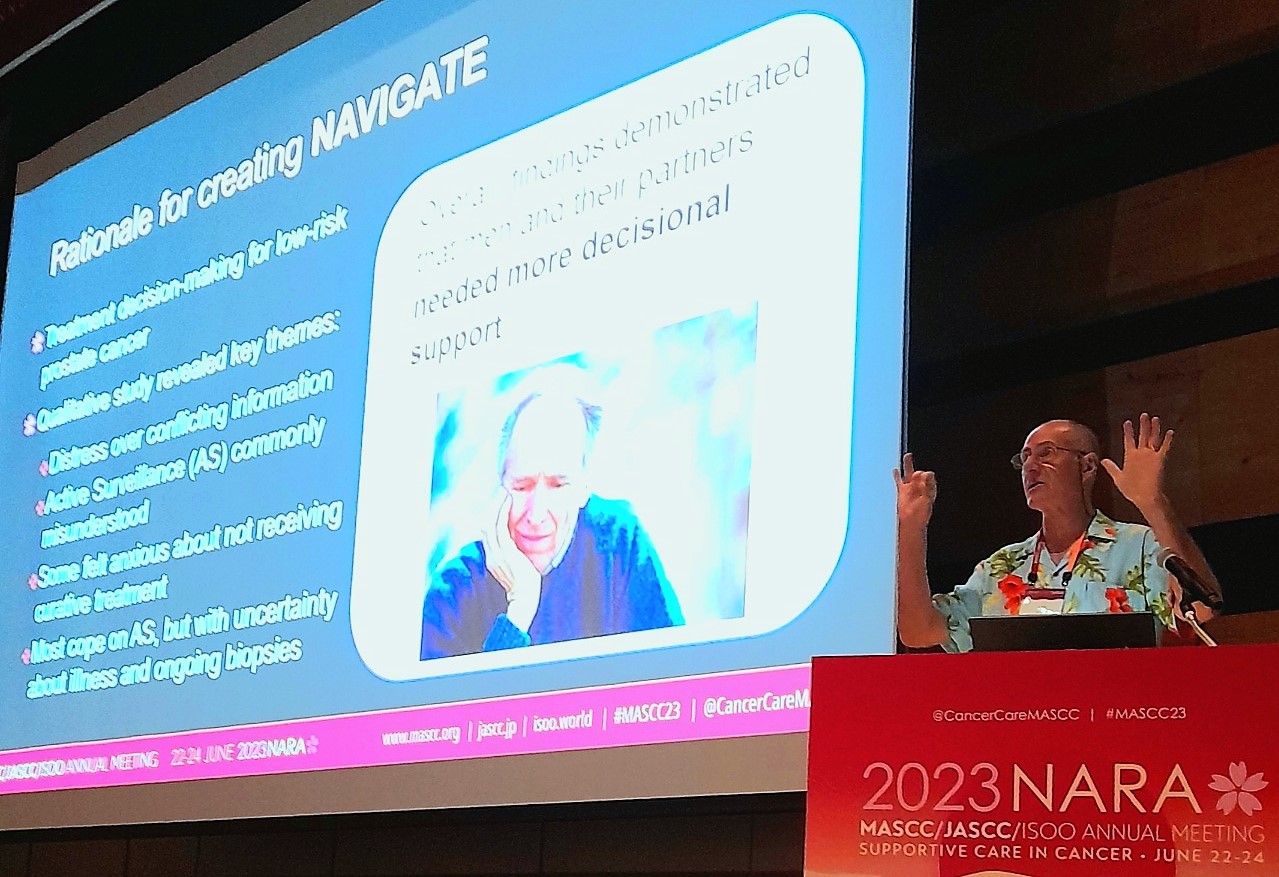
- Details
- Written by: Mandi Robertson
- Category: News
- Hits: 594
Two Peter Mac patient research advocates have become the first Australian patient advocates to attend the Multinational Association of Supportive Care in Cancer (MASCC) conference to share how they can help improve cancer research.
Alan and Fiona White are patient research advocates for Peter Mac-Swinburne University of Technology and have collaborated with researchers and clinicians at both institutes for well over ten years.
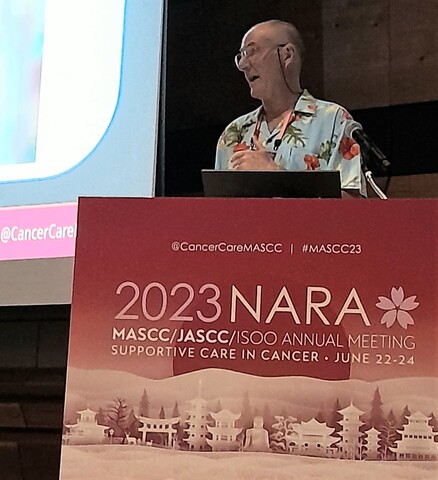
“The MASCC conference held in Nara, Japan in June discussed the entire spectrum of problems experienced by patients as a result of their cancer and cancer treatment,” said Penny Scofield Professor of Digital Healthcare Innovation at Peter Mac and Professor of Health Psychology, Swinburne University of Technology.
“I’m thrilled that Alan and Fiona were invited to speak at MASCC about their experiences of working with researchers and clinicians.
“Their experience of cancer is pivotal to how we conduct research, what questions we ask and how we communicate with patients and their loved ones,” she said.
“It was a wonderful experience to make connections and meet so many remarkable people at the conference, but it was also wonderful to help researchers understand the contribution and insights we can bring to their research,” patient research advocate, Alan White, said.
“My first presentation highlighted the gender imbalance that exists with research advocates and workshopped some of the reasons why this might occur and how we can try and get more men engaged as advocates.
“I also shared how Fiona and I helped contribute to the NAVIGATE program to ensure the program met the needs of people with low-risk prostate cancer trying to understand the best course of treatment for them,” Alan said.
Alan and Fiona were also involved in the first ever role play at a MASCC conference. The role play was designed to demonstrate codesign of digital solutions to support self-management for adults with cancer using sexual rehabilitation as an example.
Peter Mac currently has 218 patient research advocates that assist with a range of activities. Their contribution is greatly appreciated.
